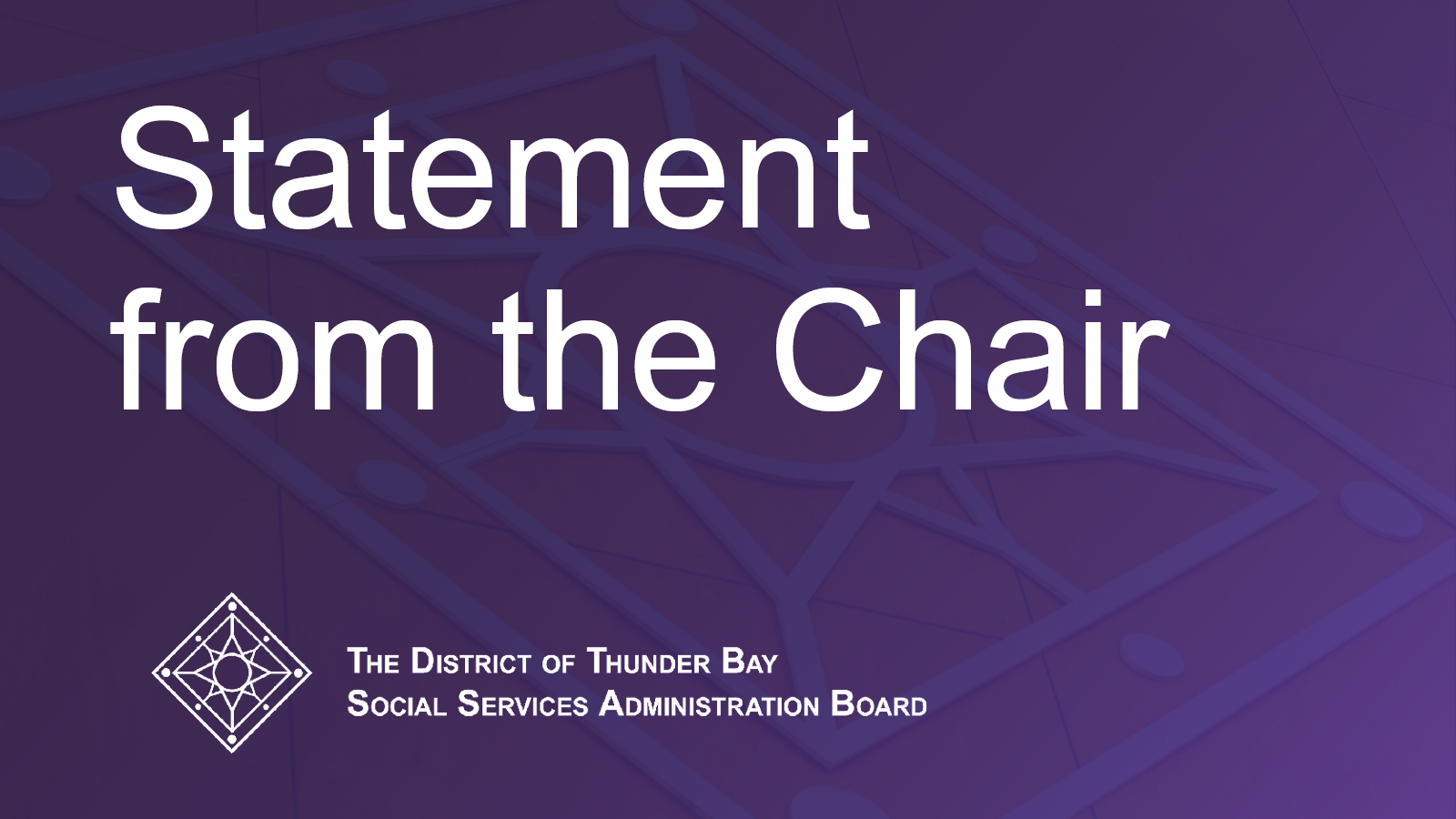Statement From The Chair
Homelessness in the City of Thunder Bay
October 22, 2021
On behalf of The District of Thunder Bay Social Services Administration Board, I would like to take a moment to address the current state of homelessness in the city of Thunder Bay.
In recent months, with an increase over the last few days, there has been significant media attention surrounding homelessness in Thunder Bay. As service system manager for the provincial Community Homelessness Prevention Initiative (CHPI) fund in our District, we know that these issues are not new. Recent media attention has certainly made homelessness more visible, but what has been in the spotlight is only the tip of the iceberg of a long-standing issue.
Service providers in our community are already doing all they can to help homeless individuals in the city of Thunder Bay with the current level of funding available to them. TBDSSAB staff already participate and contribute to a number of tables in Thunder Bay, including the Situation Table, the Coordinated Housing Access Table, and the Community Safety and Wellbeing table. TBDSSAB also hosts the table of homelessness program funders, to discuss strategy and direction.
More recently, through funding available through the province of Ontario under SSRF, TBDSSAB has been able to support new initiatives and outreach services to homeless individuals in encampments all over the city. TBDSSAB provided funding to Elevate NWO and to Matawa’s WiiChiiHehWayWin street outreach program to reach individuals in encampments and connect them to temporary shelter. These initiatives are only possible because of one-time funding available from the Ministry of Municipal Affairs and Housing as a result of COVID-19, though the issues are longstanding. These are temporary measures, and the sustainable solution is more transitional housing.
Transitional housing refers to a supportive–yet temporary- type of accommodation that is meant to bridge the gap from homelessness to permanent housing by offering structure, supervision, support (for addictions and mental health, for instance), life skills, and in some cases, education and training. (Source: Homeless Hub)
To support transitions from homelessness, TBDSSAB’s Transitional Outreach Support Workers attended the encampments to connect with individuals and help them access financial support and look for housing. The TOSW team has been supporting emergency shelter users since 2017, and 268 individuals have been housed under the High Needs Homeless initiative since this program’s inception. This is a program that works well for those who are ready for independent living, but those who are not able to live independently often become chronically homeless without the right supports.
Chronic homelessness in our community is not due to lack of community partnerships, networks, or tables. Chronic homelessness is an issue because our District desperately needs more supportive housing spaces and funding for mental health and addictions supports. Before TBDSSAB endorses the creation of yet another table, network, or protocol to address homelessness we will review the existing connections among organizations to address these issues.
The TBDSSAB Board of Directors has advocated to provincial government officials for transitional housing, as well as for our community partners to receive mental health and addictions funding to better support tenants. TBDSSAB was successful in obtaining funding to establish a 30-bed transitional housing facility in 2018 (the Lodge on Dawson), which is operated by SJCG, along with ongoing operational support to assist individuals with case management. Given the need for housing, it is unfortunate that there were no projects in the District approved under the Federal Rapid Housing Initiative. It is especially unfortunate that the future of the Junot Avenue transitional housing facility is uncertain, as the project would have made a significant impact on our communities.
There is a misconception that the need for transitional housing is solely a social issue to be solved by affordable housing providers. Transitional, supportive housing is a health issue. Homelessness prevention will not be effective until we have the full support of all ministries to ensure that individuals who are not ready for independent living have the supports they need to stay housed in a transitional setting. More supportive housing units will allow us to better allocate available Community housing to those who are able to live independently.
We know a lot of work has been done to address homelessness in our community. However, now is not the time for celebration—there is still more work to be done. In the meantime, we will continue to do what we can with the resources available to us. We remain hopeful that funding announcements will be made in the near future, and we will continue to work with community partners to support the homeless in Thunder Bay.
Finally, I would like to address the recent attacks that have occurred in Thunder Bay. It is heartbreaking to see people who are struggling be targeted and further dehumanized by those who cannot even begin to understand their circumstances. Now is the time for understanding and compassion, and never violence and hatred.
Lucy Kloosterhuis
Board Chair, The District of Thunder Bay Social Services Administration Board


